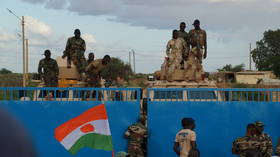African nations to dissolve Paris-backed G5 Sahel alliance
Chad and Mauritania are considering measures to end the union after the withdrawal of three founding states
Chad and Mauritania, the only two remaining members of the Paris-backed G5 Sahel alliance, announced on Wednesday that they were allowing the African anti-jihadist coalition to dissolve. The decision follows the withdrawal of the three other founding members.
The G5 grouping was formed in 2014 and included Mauritania, Chad, Burkina Faso, Mali, and Niger. In 2017, the five African countries agreed to deploy a joint anti-terrorism task force in the Sahel region, which has been plagued by jihadist violence for more than a decade.
However, Burkina Faso and Niger announced last week that they had decided to withdraw “in full sovereignty” from all G5 Sahel bodies, including the joint military force. Mali resigned from the organization in 2022, claiming it had been “instrumentalized by the outside world.”
In a joint statement on Wednesday, Chad and Mauritania said they had both taken note of and “respect the sovereign decision” of the West African nations to leave the Paris-supported pact.
The Mauritanian government, which currently holds the group’s presidency, will, along with Chad, “implement all the necessary measures in accordance with the provisions of the Convention on the Creation of the G-5 Sahel, particularly in its article 20,” both countries stated.
Article 20 of the pact declares that the union can be dissolved if at least three member states request it.
“However, the Islamic Republic of Mauritania and the Republic of Chad intend to continue their efforts, with all the countries of the Sahel, to meet the challenges facing the region,” they added, according to the statement published by the Mauritanian News Agency.
Mali, Niger, and Burkina Faso, all former French colonies now under military rule, signed a charter in September to form the Alliance of Sahel States (AES) after cutting off military ties with France following coups in their respective countries. The military rulers of the Sahel nations have all accused Paris of meddling and failing to quell the jihadist insurgencies that its troops were deployed to fight in the region a decade ago.
Meanwhile, the foreign ministers of the three landlocked African states held their first meeting last week and agreed on “appropriate measures” for the operations of the AES.
Niger’s coup leaders believe that the new union, which seeks to allow all three countries to jointly fight both external and internal security threats, will transform the region from a “zone of insecurity” into a “zone of prosperity.”
Niger and Burkina Faso had previously cited the security failures of the G5 Sahel group as a reason for their decision to quit the organization.
You can share this story on social media:








Comments are closed.